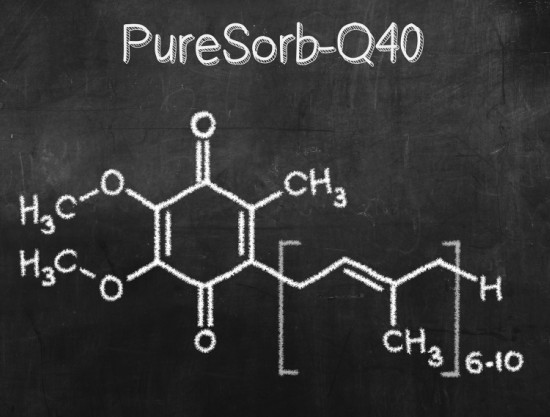CoQ10 has long been a staple of the natural products industry, but its effectiveness is a disappointment when you take a look underneath the hood.
It’s meant to be a powerful antioxidant that turbocharges your mitochondria, but only 1-2% of it is absorbed because its high molecular weight and non-polarity make it hard to get out of your stomach and into your mitochondria where they belong.
The Cochrane Foundation concluded there’s no conclusive evidence that CoQ10 is particularly effective for its most commonly used purposes of cardiovascular health and oxidative capacity.
CoQ10 is a product that should work in theory, but falls short of expectations in practice.
The Trouble in Paradise
The problem with CoQ10 isn’t that it’s ineffective, it’s that your body is poorly equipped to get it in places where it does any good.
Getting the issue of nutrient transport right is a field of medicine called pharmacokinetics (how something moves through your body), and it’s the step-brother of the much more ballyhooed field of pharmacodynamics, which is what gets the most play in the media. [footnote]Pharmacodynamics is the study of what a nutrient does when it’s inside your body.[/footnote]
CoQ10 hardly dissolves in anything and it doesn’t move through your cell walls very well because of its lack of electrical charge. That’s problematic because inside your body CoQ10 resides in your mitochondrial membrane, a part of your body that pumps out large amounts of charged electric current in order to produce energy, so it’s very difficult for oral CoQ10 to make its way there to stay.
But luckily there are a few CoQ10 alternatives that do most of its vital functions much more effectively than CoQ10 itself, so it would behoove supp-a-holics to take a look at these choices instead.
MitoQ
MitoQ is a next-gen version of CoQ10 that gets around CoQ10’s ineffectiveness by attaching something called a TPP sidechain to the base CoQ10 molecule. The TPP sidechain gives it an electrical charge that gives it a special affinity for the mitochondria which allows it to get taken up much more effectively than normal CoQ10.
In cell line studies MitoQ is about 800% more effective in getting into the mitochondrial membrane, and in humans the uptake into the inner mitochondrial membrane is estimated to be approximately 10-15%.
Inside the cell MitoQ “docks” itself into the walls of the mitochondria which allows it to stabilize the organelle and turn itself over more quickly so it can perform the antioxidant activities of CoQ10 more effectively than CoQ10 itself.
MitoQ has perhaps more R&D behind it than any other product in the supplement industry and there’s quite a bit of clinical research on the molecule’s effectiveness. A quick search on PubMed shows there are currently 177 studies performed with MitoQ that cover a broad range of areas such as absorption, toxicity, antioxidant activity and treatment for degenerative diseases such as Parkinson’s and MS.
MitoQ is effective at 5mg doses and most people experience increased benefits up to 20mg doses before it begins to taper off.
It’s not cheap, but in this case you get what you pay for.
C60 (Buckminsterfullerene)
We’ll file this one under “speculative” for now, but it’s still worth talking about.
C60 is a type of molecule called a fullerene, and it’s a network of carbon atoms that are linked together like a soccerball. (See the pic above). It was hypothesized to exist in the 1970’s when research on unsaturated carbon-chains was getting underway and finally discovered in 1985, which allowed its research-provocateurs to get a Nobel Prize for their discovery in 1996.
C60 is a tantalizing health compound because its outer-shell can undergo redox reactions in 6 different places and is extremely stable, so its potential to be an uber-antioxidant seems plausible even though the evidence of it having any effect in the human body is scarce.
There was a stir in the online health community when a study reported that C60 extended the lifespan of cancerous rats by 90% compared to the control group, creating a wave of speculation that the world’s next super-oxidant was on its way.
This result was exciting, but it’s best to remember that history has taught us this type of irrational exuberance is usually just that. The study itself only used 6 rats in each group, and in my opinion did not do enough to account for the potential effect of outliers in its sample results. It used something called the Shapiro-Wilk test to detect how well their results fit a bell curve but it’d be best to search for individually extreme results and discard them since the margin of error for an n=6 sample is very large. So it’s possible for the results to be technically “normal” even though they’re not really experimentally valid.
The results for the C60 rats were striking both for what was observed and what wasn’t. In addition to prolonged lifespans they also showed remarkably less organ damage when doused with CCL4 (a powerful free radical that’s used to poison animals in studies) and amounts of active glutathione 2-4x greater than the control group.
What was also curious is what showed up when they tried to find the remnants of C60 in tissues: nothing. Nary a trace was found in tissues and overall absorption was measured at less than 1%.
This means C60 is either such a powerful antioxidant that it can exert all these whiz-bang therapeutic benefits before you crap it out or much of the study was a statistical artifact.
To be honest….either could be true. The idea of a supplement having a prolonged therapeutic benefit even though it only does a drive by through your colon might sound implausible but that’s basically how probiotics work. They don’t heal your gut because they colonize your microbiome. They pass right through but release various messenger particles in your colon which seems to stimulate different types of autoimmune activity before you evict them out of your anus 4 hours later.
There’s never been a study in human on C60 so there’s really not much you can say about how well it does or doesn’t work in humans. C60 does not seem to be toxic even at high doses and if you want to buy it you’ll usually get it in olive oil.
There are no well validated suppliers at this point and searching the web for vendors takes you to websites that have a vintage 1990’s aesthetic, which isn’t a good thing when you’re thinking about spending money there.
PQQ
PQQ is a CoQ10 like molecule that has the unique benefit of causing your body to produce more mitochondria, which is the basis for its health benefits.
PQQ turns on genes that generate a protein called PGC-1-alpha, which is involved in producing mitochondria and is the likely reason it allows your body to make more of them. At least 7 different studies have been done on mice and the results usually suggest an increase in mitochondrial count of 10-30% in energy intensive organs like the liver and heart.
The majority of PQQ’s observed health benefits are all downstream of this Mito-boosting capability, such as cognitive function due to reduced inflammation, improved antioxidant status, and some improvements in symptoms common in degenerative disease.
The clinical evidence surrounding PQQ in humans is thin but it has the benefit of being well absorbed. It’s a water soluble compound and approximately 20-80% of it leaves the GI tract, which is 10-40x that of CoQ10. And because its main pathway is ancillary to the other nutrients listed here, it’s a very nice compliment for those looking for natural, non-invasive ways to improve cellular health.
BioPQQ is the most validated brand of PQQ and is the only company that’s conducted clinical trials on its product and is the version of PQQ that should be used. There are some other trademarked versions of PQQ but after looking at them more closely I decided these other companies had little teeth behind their marketing claims and offer nothing unique over generic forms.
PureSorb-Q40
Most people would be best served to avoid CoQ10 altogether in lieu of the substitutes listed here. However, there’s one compelling reason to continue using it: if you’re on a statin.
Statins are a class of drug that block the production of cholesterol, but they inadvertently stop your body from making CoQ10 because it’s made from the same pathway that makes cholesterol.
The nutrients listed above beat CoQ10 as a general purpose antioxidant but they can’t fulfill its role in something called the electron transport chain, which is a system in your body that produces energy and absolutely requires CoQ10 as a structural component.
For this reason someone taking CoQ10 alongside a statin would be suited to take a high absorption form of CoQ10, such as Q-Sorb.
QSorb is a specially prepared form of CoQ10 that’s water soluble, which solves a lot of the problems with regular CoQ10 since it must be well dissolved in a lipid to get transported out of the small intestine after a meal.
One absorption study was done comparing its uptake to regular CoQ10 and found that in humans the total amount absorbed into the bloodstream was about twice as high as regular CoQ10.






Excellent in depth study as always – thanks Jonathan. We can always rely on you to tell it like it is, with no spin but with your sense of humour included 🙂
LikeLike
Your article is misleading. You’re telling people to stay away from a very effective and safe substance. Would you tell people to stay away from paracetamol if they had a headache?
It’s a given if you use low quality CoQ10 products you can’t expect any effect, but if you use a good quality you’ll definitely get results. Not only in theory but also in practice.
LikeLike
Martin,
You’re apparently new here and don’t get Jonathan’s schtick: he’s the pied piper of gullible supplement junkies and makes his living telling people what they want to hear about their vitamins. Just read through the blog and you’ll be treated to mountains of shamanist articles on how to use vitamin C to cure cancer, deer antler velvet to get an erection, and so on.
He uses clever graphics and lots of scientific verbiage to shroud the true meaning of his blog: to collect payments from supplement companies hungry to peddle their products onto gullible customers.
LikeLike
Del Toro,
I’m sorry, but I’ve never written about any of that stuff and I don’t get paid for my reviews.
LikeLike
Martin,
You’re apparently new here and don’t know about Del Toro’s schtick: every month or so he drops in and totally trolls everything written about supplements for the sole purpose of making himself feel good, even if it means arguing against a bunch of stuff no one ever said in the first place and being a total dick.
LikeLike
Hi Martin,
I definitely think generic CoQ10 is safe, but I don’t think it’s particularly effective. If you replace the words “low quality” with “generic” then I’d agree, but that’s sort of the point of the article: a standard CoQ10 product is not well absorbed and thus performs well below it’s therapeutic potential, hence the point of this article.
LikeLike
Interesting read, but I have to disagree. I get the assertion of 1-2% average absorption for CoQ10 because of all the terrible products out there. However, many human clinical trials have shown amazing results with high quality, pharmaceutical-grade ubiquinone products. For example, reduced cardiovascular mortality by 43% in Heart Failure patients (Q-Symbio study) and 54% reduced cardiovascular mortality in healthy senior citizens when combined with selenoprecise selenium (KiSel-10 study).
It’s too easy to judge CoQ10 across the board and ignore the few superb products on the market. Unless, of course, there is a reason to purposefully ignore CoQ10 products with documented absorption, effects and statistically significant results from human clinical trials?
LikeLike
Hi Martin,
You’re right that well prepared CoQ10 products will have better absorption rates than generic ones. The absorption figure I mentioned referenced the absorption of a generic CoQ10 product, not a specially prepared one.
Notice my comment about CoQ10 basically being effective in the body if it’s well absorbed.
LikeLike
Hi, my husband has severe itching with Ubiquinol CoQ10 and is looking for an alternative. Any suggestions?
Thank you!!
LikeLike
What is the best form of CoQ10 to use if you have mitochondrial issues for people in their 50s-60s? Is there a difference for people who have had congestive heart failure or atrial fibrilation? Which is the best form and doses in these situations?
LikeLike